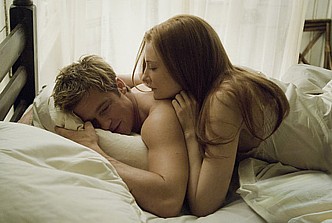
"Knight Thoughts" - exclusive web content
David Fincher's strange romantic epic with Brad Pitt and Cate Blanchett has its greatest impact the first time around
First Time's the Charm:
The Curious Case of Benjamin Button
12-31-08 "Knight Thoughts" web exclusive
By Richard Knight, Jr.
The Curious Case of Benjamin Button
12-31-08 "Knight Thoughts" web exclusive
By Richard Knight, Jr.
The late film critic Pauline Kael might have been right to rigidly refuse to see a movie more than once. What at first seems a breath
of fresh air, on second glance seems a tad stale and what is overlooked in the rush to take in the filmmaker’s overwhelming vision
becomes apparent after a second go round. This has been my experience with The Curious Case of Benjamin Button, the
sumptuous romantic epic that marks the third collaboration between director David Fincher and Brad Pitt in which Pitt co-stars with the
luminous Cate Blanchett.
Who would’ve thought Fincher, with his overtly sour resume would make what on first look seems such a strangely sweet movie as
this? Based on the sliver thin but tantalizing conceit by F. Scott Fitzgerald, the story follows the title character who is born old at the
end of the First World War and then grows younger as the years advance and his on and off again romance with the red-haired
Daisy, a free spirited dancer. Pitt and Blanchett play the two love birds whose romance blooms in the middle when their ages and
superb physical specimens finally match up. But the romance is doomed because as Daisy ages Benjamin continues getting younger
until he is glimpsed as a young boy beset with Alzheimer’s and old age maladies, and finally, as a baby, lying in Blanchett’s withered
arms. It’s not quite explained how Benjamin physically shrinks, however.
Also not explained is why – beyond the early physical fascination – the other characters are so drawn to the emotionally withdrawn
Benjamin, who, until his affair with Daisy takes hold, seems only to exist by drawing on the life forces of the other characters. The
lively swirl of humanity surrounding Benjamin – his black step-mother, an artistic piano teacher, a “character” who takes him to a
sporting house for his first physical encounter, a rough hewn sea captain, an icy diplomat’s wife, his guilt ridden father, etc. – all
seem to leave more than they take from Benjamin the Black Hole who never reacts much to anything beyond a cautious smile. Pitt’s
character is a vacuum at the center of the film sucking in all the others and not really giving anything back. That is until he finally
looks like the movie star Brad that audiences have enshrined since Thelma & Louise. The film finally comes to life when we see Pitt
astride his Harley, a latter day golden haired Brando, as the women and gay men in the audience swoon and everyone looks on in
envy at such physical beauty and the confidence it projects.
The story is told in flashback by the dying Daisy to her daughter (Julia Ormond) as Hurricane Katrina is about to strike New Orleans.
This hoary old framing device offers Blanchett the chance to practice her old lady emoting and the special effects and make-up
departments go wild at the opportunity but these scenes really add nothing to the overlong, episodic story. Nor does Pitt as the
elusive Benjamin, though for the first hour of the picture he also gets to play old and narrates the picture in his southern accent (his
bland monotone voice works, however, because the character’s such a cipher). Blanchett, playing the emotional Southern belle, a
dancer whose career is cut short is just the opposite and her porcelain, delicate beauty and line shadings are entrancing.
The movie is gorgeously filmed with much of it given a golden glow. It’s mostly set in New Orleans and the combination of the sultry
cinematography, the vintage Dixie Land jazz heard on the soundtrack and a handful of quirky characters turns the city into one of
the film’s strongest characters (it’s like a faded valentine rediscovered). The New Orleans jazz is matched by another pretty,
shimmering score by Alexandre Desplat.
Overall, the film seems more like a beautiful curio than anything else, a sort of artsy fartsy Forest Gump with the love affair played
out against the great events of the 20th century (this is not unexpected as both scripts were penned by Eric Roth, this one co-written
by Robin Swicord). The relationship between Benjamin and Daisy has many of the stop/start aspects of Pip and Estella from Dickens
“Great Expectations” that Roth also used in Gump but there’s not nearly as much of Pip’s romantic yearning that practically leaps off
Dickens’ pages. Pitt as Benjamin says a lot more in voice over than he ever seems to impart to Daisy (and the less said about Pitt’s
affair during the strange Russian episode with Tilda Swinton, playing yet another iceberg, the better). Also like Gump, many of the
voiceovers begin to sound like parody a second time around. But there is something undeniably cool and weird and oddly
compelling here – it’s a movie that Goths will surely adore – and whatever it is swept me away the first time I saw the film.
After that first screening of The Curious Case of Benjamin Button I thought something the piano teacher tells Pitt was the message of
the movie. Commenting about his tentative playing she says with reassurance, “It doesn’t matter how well you play, it matters how
much you feel” but on reflection I think what Fincher the fatalist is really trying to impart is another of his grim messages – albeit
one disguised within the center of his golden romance. So movie romantics are warned to see the film once and never again
because Fincher’s saying what he’s pretty much said in all his dour pictures and it’s the antithesis of what any hopeless romantic fool
likes to take home from a movie – life sucks, then you die – and sometimes you leave behind a teeny, tiny corpse.
of fresh air, on second glance seems a tad stale and what is overlooked in the rush to take in the filmmaker’s overwhelming vision
becomes apparent after a second go round. This has been my experience with The Curious Case of Benjamin Button, the
sumptuous romantic epic that marks the third collaboration between director David Fincher and Brad Pitt in which Pitt co-stars with the
luminous Cate Blanchett.
Who would’ve thought Fincher, with his overtly sour resume would make what on first look seems such a strangely sweet movie as
this? Based on the sliver thin but tantalizing conceit by F. Scott Fitzgerald, the story follows the title character who is born old at the
end of the First World War and then grows younger as the years advance and his on and off again romance with the red-haired
Daisy, a free spirited dancer. Pitt and Blanchett play the two love birds whose romance blooms in the middle when their ages and
superb physical specimens finally match up. But the romance is doomed because as Daisy ages Benjamin continues getting younger
until he is glimpsed as a young boy beset with Alzheimer’s and old age maladies, and finally, as a baby, lying in Blanchett’s withered
arms. It’s not quite explained how Benjamin physically shrinks, however.
Also not explained is why – beyond the early physical fascination – the other characters are so drawn to the emotionally withdrawn
Benjamin, who, until his affair with Daisy takes hold, seems only to exist by drawing on the life forces of the other characters. The
lively swirl of humanity surrounding Benjamin – his black step-mother, an artistic piano teacher, a “character” who takes him to a
sporting house for his first physical encounter, a rough hewn sea captain, an icy diplomat’s wife, his guilt ridden father, etc. – all
seem to leave more than they take from Benjamin the Black Hole who never reacts much to anything beyond a cautious smile. Pitt’s
character is a vacuum at the center of the film sucking in all the others and not really giving anything back. That is until he finally
looks like the movie star Brad that audiences have enshrined since Thelma & Louise. The film finally comes to life when we see Pitt
astride his Harley, a latter day golden haired Brando, as the women and gay men in the audience swoon and everyone looks on in
envy at such physical beauty and the confidence it projects.
The story is told in flashback by the dying Daisy to her daughter (Julia Ormond) as Hurricane Katrina is about to strike New Orleans.
This hoary old framing device offers Blanchett the chance to practice her old lady emoting and the special effects and make-up
departments go wild at the opportunity but these scenes really add nothing to the overlong, episodic story. Nor does Pitt as the
elusive Benjamin, though for the first hour of the picture he also gets to play old and narrates the picture in his southern accent (his
bland monotone voice works, however, because the character’s such a cipher). Blanchett, playing the emotional Southern belle, a
dancer whose career is cut short is just the opposite and her porcelain, delicate beauty and line shadings are entrancing.
The movie is gorgeously filmed with much of it given a golden glow. It’s mostly set in New Orleans and the combination of the sultry
cinematography, the vintage Dixie Land jazz heard on the soundtrack and a handful of quirky characters turns the city into one of
the film’s strongest characters (it’s like a faded valentine rediscovered). The New Orleans jazz is matched by another pretty,
shimmering score by Alexandre Desplat.
Overall, the film seems more like a beautiful curio than anything else, a sort of artsy fartsy Forest Gump with the love affair played
out against the great events of the 20th century (this is not unexpected as both scripts were penned by Eric Roth, this one co-written
by Robin Swicord). The relationship between Benjamin and Daisy has many of the stop/start aspects of Pip and Estella from Dickens
“Great Expectations” that Roth also used in Gump but there’s not nearly as much of Pip’s romantic yearning that practically leaps off
Dickens’ pages. Pitt as Benjamin says a lot more in voice over than he ever seems to impart to Daisy (and the less said about Pitt’s
affair during the strange Russian episode with Tilda Swinton, playing yet another iceberg, the better). Also like Gump, many of the
voiceovers begin to sound like parody a second time around. But there is something undeniably cool and weird and oddly
compelling here – it’s a movie that Goths will surely adore – and whatever it is swept me away the first time I saw the film.
After that first screening of The Curious Case of Benjamin Button I thought something the piano teacher tells Pitt was the message of
the movie. Commenting about his tentative playing she says with reassurance, “It doesn’t matter how well you play, it matters how
much you feel” but on reflection I think what Fincher the fatalist is really trying to impart is another of his grim messages – albeit
one disguised within the center of his golden romance. So movie romantics are warned to see the film once and never again
because Fincher’s saying what he’s pretty much said in all his dour pictures and it’s the antithesis of what any hopeless romantic fool
likes to take home from a movie – life sucks, then you die – and sometimes you leave behind a teeny, tiny corpse.


